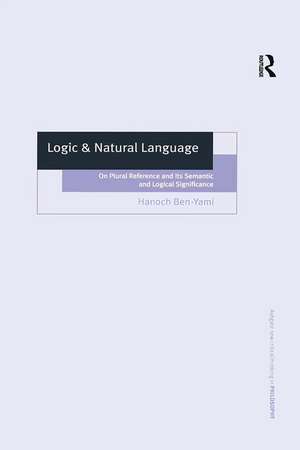Logic & Natural Language: On Plural Reference and Its Semantic and Logical Significance: Ashgate New Critical Thinking in Philosophy
Autor Hanoch Ben-Yamien Limba Engleză Paperback – 18 dec 2020
Din seria Ashgate New Critical Thinking in Philosophy
-
 Preț: 463.30 lei
Preț: 463.30 lei -
 Preț: 489.26 lei
Preț: 489.26 lei -
 Preț: 489.26 lei
Preț: 489.26 lei - 25%
 Preț: 324.16 lei
Preț: 324.16 lei - 16%
 Preț: 338.33 lei
Preț: 338.33 lei - 15%
 Preț: 444.10 lei
Preț: 444.10 lei - 18%
 Preț: 997.38 lei
Preț: 997.38 lei -
 Preț: 469.34 lei
Preț: 469.34 lei -
 Preț: 469.34 lei
Preț: 469.34 lei - 16%
 Preț: 299.06 lei
Preț: 299.06 lei -
 Preț: 469.34 lei
Preț: 469.34 lei - 17%
 Preț: 233.51 lei
Preț: 233.51 lei -
 Preț: 469.34 lei
Preț: 469.34 lei - 26%
 Preț: 765.04 lei
Preț: 765.04 lei -
 Preț: 489.26 lei
Preț: 489.26 lei -
 Preț: 469.34 lei
Preț: 469.34 lei - 26%
 Preț: 736.69 lei
Preț: 736.69 lei -
 Preț: 389.38 lei
Preț: 389.38 lei - 18%
 Preț: 1000.27 lei
Preț: 1000.27 lei -
 Preț: 469.34 lei
Preț: 469.34 lei -
 Preț: 469.34 lei
Preț: 469.34 lei - 26%
 Preț: 764.20 lei
Preț: 764.20 lei - 13%
 Preț: 338.33 lei
Preț: 338.33 lei - 17%
 Preț: 338.33 lei
Preț: 338.33 lei - 12%
 Preț: 312.43 lei
Preț: 312.43 lei - 18%
 Preț: 1000.27 lei
Preț: 1000.27 lei - 28%
 Preț: 739.02 lei
Preț: 739.02 lei -
 Preț: 489.26 lei
Preț: 489.26 lei -
 Preț: 480.40 lei
Preț: 480.40 lei
Preț: 414.04 lei
Nou
Puncte Express: 621
Preț estimativ în valută:
79.24€ • 82.42$ • 65.41£
79.24€ • 82.42$ • 65.41£
Carte tipărită la comandă
Livrare economică 14-28 aprilie
Preluare comenzi: 021 569.72.76
Specificații
ISBN-13: 9781138273801
ISBN-10: 1138273805
Pagini: 168
Dimensiuni: 156 x 234 mm
Greutate: 0.25 kg
Ediția:1
Editura: Taylor & Francis
Colecția Routledge
Seria Ashgate New Critical Thinking in Philosophy
Locul publicării:Oxford, United Kingdom
ISBN-10: 1138273805
Pagini: 168
Dimensiuni: 156 x 234 mm
Greutate: 0.25 kg
Ediția:1
Editura: Taylor & Francis
Colecția Routledge
Seria Ashgate New Critical Thinking in Philosophy
Locul publicării:Oxford, United Kingdom
Cuprins
Contents: Preface; Introduction; Part I Plural Referring Expressions: Plural referring expressions in natural language; Common nouns as plural referring expressions; The sources of the analysis of referring nouns as predicates; Reference. Part II Quantification: Quantification: natural language versus the predicate calculus; Multiple quantification; Pronouns, variables, and bound anaphors. Part III A deductive system for natural language: Derivation rules and consistency; Applications I: Aristotelian logic; Applications II: beyond Aristotelian logic. Conclusions; Bibliography; Index.
Recenzii
'I have been reading this book with great admiration and also with great sympathy. I wholeheartedly agree that the syntax and semantics of natural language can be perfectly well understood, and even sytematised, without any recourse to the predicate calculus - which, indeed, is a distortion of the whole thing. I much enjoyed what Ben-Yami said about identity and relished his bold and forceful conclusions. Ben-Yami has done a most valuable and important service to philosophy in general and to the philosophy of language in particular. P. F. Strawson, University College, Oxford 'In this bold and highly original book, Dr Ben-Yami examines the logico-semantic features of plural reference in natural languages, and demonstrates the inadequacy of the Frege/Russell treatment of this semantic function in the predicate calculus. From this apparently minor flaw, he shows in detail how the pretensions of the calculus to represent the semantics of natural language progressively unravel, and offers in its place a novel deductive system for natural language of comparable power. The argument is a tour de force of dispassionate logico-linguistic analysis, written with luminous clarity. It will force a thoroughgoing reconsideration of the status and value of the predicate calculus.' P.M.S. Hacker, Fellow of St John's College, Oxford
Notă biografică
Dr Hanoch Ben-Yami works in the Philosophy Department at the Central European University of Hungary
Descriere
Frege's invention of the predicate calculus has been the most influential event in the history of modern logic. The calculus’ place in logic is so central that many philosophers think, in fact, of it when they think of logic. This book challenges the position in contemporary logic and philosophy of language of the predicate calculus claiming that it is based on mistaken assumptions. Ben-Yami shows that the predicate calculus is different from natural language in its fundamental semantic characteristics, primarily in its treatment of reference and quantification, and that as a result the calculus is inadequate for the analysis of the semantics and logic of natural language.
